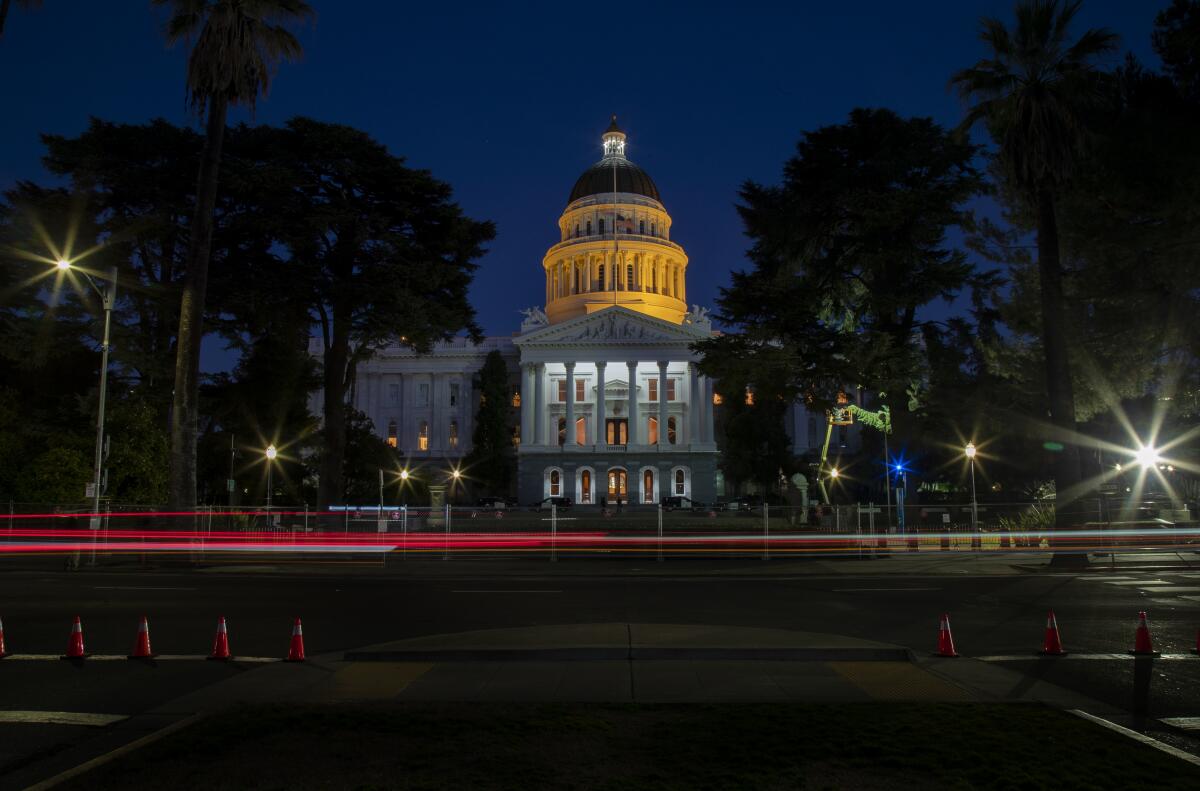Op-Ed: California should protect the work rights of family caregivers

As travel ground to a halt in April 2020, the janitorial staff at a hotel chain were furloughed. When business resumed, everyone was called back — everyone, that is, except the mothers.
In a pandemic layoff at another company, only two people lost their jobs — one was a new mother, the other was on maternity leave.
When a woman complained about insufficient COVID-19 protection at a warehouse distribution center, her bosses retaliated by rescheduling her, making it nearly impossible for her to supervise her children’s remote schooling and do her job at the same time.
We see discrimination against parents at the UC Hastings Law School Center for WorkLife Law during normal times, but calls to our hotline increased sevenfold as COVID-19 took hold.
It’s no news that workers are vulnerable because of the weakness of American employment laws, but it may be news that their family responsibilities may put them at greater risk.
Employers prefer “ideal” workers, the kind whose home lives don’t impose on workdays or require even occasional flexibility. The pandemic upended the notion that cookie-cutter rigidity is a work prerequisite, but it also gave some bosses cover to stick with the old mindset, as the workers who’ve been calling us discovered.
California is considering legislation that would push such employers into new thinking.
Assembly Bill 1119, now under committee consideration, would amend the state’s Fair Employment and Housing Act in two ways: It would make it illegal for employers to discriminate against people seeking, obtaining and holding work based on family caregiving responsibilities. And it would require employers to give regular caregivers — those with “direct and ongoing” responsibilities for children and other family members — simple accommodations, such as the right to arrive a few minutes late when school or childcare becomes unexpectedly unavailable, unless the accommodation imposes an undue hardship on the employer.
The accommodations provision in the bill is particularly crucial for low-wage workers. A single mom earning $25,000 a year called our hotline. She had requested a reduced schedule to care for her 1-year-old and two older kids who were in virtual schooling because of pandemic closures; her request was denied. It wasn’t until her stress and anxiety caused her doctor to order the reduced work schedule that her boss complied — disability accommodations are already covered in the Fair Employment law. Passage of AB 1119 would mean she wouldn’t have had to fall ill to be assured of a reasonable response to her request.
Although the pandemic has been an epic tragedy, it has had one positive effect: the democratization of remote and flexible work. COVID-19 forced the issue, making workplace flexibility that typically was only available to professionals possible for hourly workers too. We need AB 1119 to ensure that such options do not again become the perquisite of privilege.
The bill would of course help mothers, especially single mothers, who head two-thirds of low-income families in the United States. Losing a job, or not being able to find one because you have childcare responsibilities, feeds what we call the motherhood wage penalty. That disparity has all but disappeared for high-wage mothers but not low-wage ones.
Pandemic-driven automation and remote work are likely to displace workers on a much larger scale than economists had expected.
But AB 1119 is important for all parents. In tag-team scenarios, where spouses work different shifts and split caregiving, the flexibility is particularly important.
And fathers as much as mothers can be discriminated against because of caregiving duties. A teacher’s aide at a private school in Los Angeles, which didn’t shut its classrooms during the pandemic, was allowed to work from home because his race put him at elevated risk for COVID complications. But the school’s policy was that he would be fired immediately if his child appeared on his Zoom screen — even once, even for a minute. AB 1119 wouldn’t let that happen.
Finally, the proposed law also protects workers who are “direct, ongoing” caregivers for members of their extended families, as is common for people of color and low-wage workers. Grandparents, siblings, aunts and uncles can be discriminated against just as parents are; they too may require accommodation at work when the unexpected happens. We heard from one Latina, working remotely during the pandemic, whose employer fired her after her grandchild made an appearance during a Zoom: “We don’t pay you to be someone’s babysitter,” she was told.
As the pandemic has made especially clear, all California’s workers need legal protection so that their family responsibilities don’t keep them from holding a job, and for accommodations in caregiving emergencies that many high-wage professionals already get. The alternative? We regularly hear on our helpline from single mothers suddenly faced with a choice between going to work so they can feed their children and leaving them home alone. No civilized country should allow that.
Joan C. Williams is a professor at UC Hastings and the founder and director of its Center for WorkLife Law. Liz Morris is an adjunct professor at Hastings and the center’s deputy director.
More to Read
A cure for the common opinion
Get thought-provoking perspectives with our weekly newsletter.
You may occasionally receive promotional content from the Los Angeles Times.






